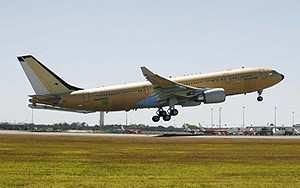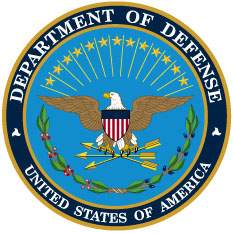Defense Department Says It Is "Disappointed" In The
Decision
 Northrop Grumman announced on its website Monday that it would
not be submitting a bid to replace the Air Forces' aging fleet of
KC-135 tankers.
Northrop Grumman announced on its website Monday that it would
not be submitting a bid to replace the Air Forces' aging fleet of
KC-135 tankers.
The following is a statement from Wes Bush, Chief Executive Officer
and President of Northrop Grumman Corporation, concerning that
program:
"After a comprehensive analysis of the
final RFP, Northrop Grumman has determined that it will not submit
a bid to the Department of Defense for the KC-X program. We reached
this conclusion based on the structure of the source selection
methodology defined in the RFP, which clearly favors Boeing's
smaller refueling tanker and does not provide adequate value
recognition of the added capability of a larger tanker, precluding
us from any competitive opportunity.
"Northrop Grumman fully respects the
Department's responsibility to determine the military requirements
for the new tanker. In the previous competition, Northrop Grumman
was selected by the Air Force as offering the most capable tanker
for the warfighter at the best value for the taxpayer. However, the
Northrop Grumman and EADS team is very disappointed that the
revised source selection methodology now dramatically favors
Boeing's smaller refueling tanker. We agree that the fundamental
military requirements for the new tanker have not changed since the
last competition, but the Department's new evaluation methodology
now clearly favors the smaller tanker.

"We continue to believe that Northrop
Grumman's tanker represents the best value for the military and
taxpayer – a belief supported by the selection of the A330
tanker design over the Boeing design in the last five consecutive
tanker competitions around the globe. Regrettably, this means that
the U.S. Air Force will be operating a less capable tanker than
many of our Allies in this vital mission area.
"Our prior selection by the Air Force,
our firm belief that we provide the best value offering, and the
hard work and commitment of the many individuals and communities on
our team over many years made this a difficult decision for our
company. But we have a fiduciary responsibility to our shareholders
to prudently invest our corporate resources, as do our more than
200 tanker team suppliers across the United States. Investing
further resources to submit a bid would not be acting
responsibly.
"We have decided that Northrop Grumman
will not protest. While we feel we have substantial grounds to
support a GAO or court ruling to overturn this revised source
selection process, America's service men and women have been forced
to wait too long for new tankers. We feel a deep
responsibility to their safety and to their ability to fulfill the
missions our nation calls upon them to perform. Taking
actions that would further delay the introduction of this urgent
capability would also not be acting responsibly.
"We recognize that our decision likely
creates a sole-source outcome for Boeing. We call on the Department
to keep in mind the economic conclusions of the prior round of
bidding as it takes actions to protect the taxpayer when defining
the sole-source procurement contract. In the previous round, the
Air Force, through a rigorous assessment of our proposal,
determined that it would pay a unit flyaway cost of approximately
$184 million per tanker for the first 68 tankers, including the
non-recurring development costs. With the Department's
decision to procure a much smaller, less capable design, the
taxpayer should certainly expect the bill to be much less."
Deputy Secretary of Defense William Lynn said the Pentagon is
"disappointed" that Northop and it's partner EADS will not be
bidding.

"In the last tanker replacement (KC-X) competition, Northrop
Grumman competed well on both price and non-price factors," Lynn
said in a statement. "We strongly believe that the current
competition is structured fairly and that both companies could
compete effectively. Based on the inputs we received from both
offerors to the Department's draft Request for Proposal (RFP), we
made changes to reduce the out-year risk to the potential
manufacturers of KC-X. However, we did not change the war-fighters'
requirements to accommodate either offeror. The Department
strongly supports trans-Atlantic defense industrial ties and
believes they benefit the American war-fighter and taxpayer."
 Aero-News: Quote of the Day (12.07.25)
Aero-News: Quote of the Day (12.07.25) ANN's Daily Aero-Linx (12.07.25)
ANN's Daily Aero-Linx (12.07.25) NTSB Final Report: Lafferty Jack Sea Rey
NTSB Final Report: Lafferty Jack Sea Rey Classic Aero-TV: The B29 SuperFortress Doc - History in Flight
Classic Aero-TV: The B29 SuperFortress Doc - History in Flight Airborne 12.08.25: Samaritans Purse Hijack, FAA Med Relief, China Rocket Fail
Airborne 12.08.25: Samaritans Purse Hijack, FAA Med Relief, China Rocket Fail





